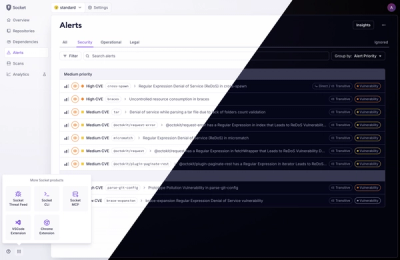
Next REST Framework
Type-safe, self-documenting REST APIs for Next.js


Table of contents
Next REST Framework is an open-source, opinionated, lightweight, easy-to-use set of tools to build type-safe, self-documenting HTTP REST APIs with Next.js. Building OpenAPI specification-compliant REST APIs can be cumbersome and slow but Next REST Framework makes this easy with auto-generated OpenAPI documents and Swagger UI using TypeScript and object schemas.
This is a monorepo containing the following packages / projects:
- The primary
next-rest-framework package
- A development test application
Lightweight, type-safe, easy to use
- Designed to work with TypeScript so that your request bodies, responses, headers etc. are strongly typed.
- Object-schema validation with popular libraries like Zod or Yup
- Supports auto-generated openapi.json and openapi.yaml documents for which you can include your existing OpenAPI specification.
- Supports any kind of middleware logic that you want to use for authentication etc. See more in Middlewares. Also works with other Next.js server-side libraries, like NextAuth.js.
- Fully customizable - You can decide which routes Next REST Framework will use to serve your API docs etc. and it can be easily customized to work with any kind of existing Next.js REST API.
npm install --save next-rest-framework
To use Next REST Framework you need to initialize the client somewhere in your Next.js project. The client exposes all functionality of the framework you will need:
import { NextRestFramework } from 'next-rest-framework';
export const { defineCatchAllHandler, defineEndpoints } = NextRestFramework();
The complete API of the initialized client is the following:
defineCatchAllHandler | A function used to generate your single catch-all API route. Must be used in the root of your API routes folder in the following path pages/api/[[...next-rest-framework]].ts. |
defineEndpoints | Used for all other API routes that you want to use Next REST Framework for. Can also be used in other catch-all API routes. |
getOpenApiSpec | A function that exposes the generated OpenAPI spec combined with your own definitions. Useful if you want to e.g. export the OpenAPI spec to a separate file. |
To initialize Next REST Framework you need to export and call the defineCatchAllHandler function from a root-level optional catch-all API route:
import { defineCatchAllHandler } from 'next-rest-framework/client';
export default defineCatchAllHandler();
This is enough to get you started. By default Next REST Framework gives you three API routes with this configuration:
/api: Swagger UI using the auto-generated OpenAPI spec./api/openapi.json: An auto-generated openapi.json document./api/openapi.yaml: An auto-generated openapi.yaml document.
All of these are configurable with the Config options that you can pass for your NextRestFramework client. You can also use your existing catch-all logic simply by passing a Route config to your defineCatchAllHandler if you want to use e.g. custom 404 handlers, redirections etc.
import { object, string, number, boolean, array } from 'zod';
import { defineEndpoints } from 'next-rest-framework/client';
const todoSchema = object({
id: string(),
name: string(),
completed: boolean()
});
export default defineEndpoints({
GET: {
responses: [
{
status: 200,
contentType: 'application/json',
schema: object({
data: array(todoSchema)
})
}
],
handler: ({ res }) => {
res.setHeader('content-type', 'application/json');
res.status(200).json({
data: [
{
id: 'foo',
name: 'bar',
completed: true
}
]
});
}
},
POST: {
requestBody: {
contentType: 'application/json',
schema: object({
name: string()
})
},
responses: [
{
status: 201,
contentType: 'application/json',
schema: object({
data: todoSchema
})
}
],
handler: ({
res,
req: {
body: {
name // Any other attribute will lead to TS error.
}
}
}) => {
const todo = createYourTodo(name);
res.setHeader('content-type', 'application/json');
res.status(201).json({
data: todo
});
}
}
});
These type-safe endpoints will be now auto-generated to your OpenAPI spec and Swagger UI!
The optional config options allow you to customize Next REST Framework. The following options can be passed as a parameter for your NextRestFramework client in an object:
openApiSpec | Your custom OpenAPI Object that will be merged with the auto-generated spec. Defaults to a minimum config required for the OpenAPI spec generation. |
openApiJsonPath | Custom path for serving openapi.json file. Defaults to /api/openapi.json. |
openApiYamlPath | Custom path for serving openapi.yaml file. Defaults to /api/openapi.yaml. |
swaggerUiPath | Custom path for service Swagger UI. Defaults to /api. |
exposeOpenApiSpec | Setting this to false will serve none of the OpenAPI documents neither the Swagger UI. Defaults to true. |
middleware | A global middleware for all of your API routes. See Global middleware for more information. |
errorHandler | A Global error handler for all of your API routes. Defaults to a basic error handler logging the errors in non-production mode. |
suppressInfo | Setting this to true will suppress all informational logs from Next REST Framework. Defaults to false. |
In addition to your method handlers, middleware and errorHandler, you can also configure OpenAPI Path Item Object parameters for your API route and they will automatically become part of your auto-generated OpenAPI spec The following options can be passed as a parameter for your defineCatchAllHandler and defineEndpoints in an object:
The required properties are used for internal type-checking and the optional properties are used for OpenAPI spec generation and come from the OpenAPI Request Body Object and Media Type Object specification.
contentType | The content type that all requests must have - requests with no content type or incorrect content type will get an error response. | true |
schema | A Zod or Yup schema describing the format of the request body. | true |
description | A brief description of the request body. This could contain examples of use. CommonMark syntax MAY be used for rich text representation. | false |
required | Determines if the request body is required in the request. All requests without a body will get an error response when this is set to true. Defaults to false. | false |
example | An example object matching the schema. | false |
examples | A mapping of Example Objects or Reference Objects matching the schema. | false |
encoding | A mapping of Encoding Objects. | false |
description | A short description of the response. CommonMark syntax MAY be used for rich text representation. | true |
status | A possible status code returned by your API route. | true |
contentType | The content type of the response. Using any other content-type will lead to a TS error. | true |
schema | A Zod or Yup schema describing the format of the response data. All response data not matching to the schema will lead to a TS error. | true |
headers | A mapping of headers to Header Objects or Reference Objects. | false |
links | A mapping of Link Objects or Reference Objects. | false |
The handler function takes care of your actual business logic, supporting both synchronous and asynchronous execution and taking in an object with three strongly typed parameters:
req | A strongly-typed NextApiRequest object containing the typed body of your request. |
res | A strongly-typed NextApiResponse object that allows you to use only pre-defined status codes, Content-Type headers and response data formats from the current method handler. |
params | An object containing the strongly-typed combined response of your Global middleware, Route middleware and Method middleware. The parameters can also be overridden in the different middleware layers with the Method middleware taking precedence over the Route middleware and route middleware taking precedence over Global middleware |
The middleware functions can be used for any kind of middleware logic, like adding authentication etc. for your API. In addition, they can be used to add additional typed parameters for your API route handlers. They support both asynchronous and synchronous execution.
middleware: () => ({
foo: 'bar'
});
handler: ({
params: {
foo // string
}
}) => {
};
The global middleware function takes in an object with two attributes and optionally returns an object of any form:
req | A plain NextApiRequest object. |
res | A plain NextApiResponse object. |
The route middleware function takes in an object with three attributes and optionally returns an object of any form:
req | A plain NextApiRequest object. |
res | A plain NextApiResponse object. |
params | The type of an object returned by your Global middleware. |
The method middleware function takes in an object with three attributes and optionally returns an object of any form:
req | A strongly-typed NextApiRequest object containing the typed body of your request. |
res | A strongly-typed NextApiResponse object that allows you to use only pre-defined status codes, Content-Type headers and response data formats from the current method handler. |
params | The type of a combined object returned by both your Global middleware and Route middleware. |
The error handler functions can be used for custom error handling. They support both asynchronous and synchronous execution.
errorHandler: ({ req, res, params }) => {
};
The global error handler takes in an object with two attributes:
req | A plain NextApiRequest object. |
res | A plain NextApiResponse object. |
Route error handler can be used to override your global error handler. The route error handler takes in an object with three attributes:
req | A plain NextApiRequest object. |
res | A plain NextApiResponse object. |
params | The type of a combined object returned by both your Global middleware and Route middleware. |
Method error handler can be used to override both your global error handler and route error handler. The method error handler takes in an object with three attributes and optionally returns an object of any form:
req | A strongly-typed NextApiRequest object containing the typed body of your request. |
res | A strongly-typed NextApiResponse object that allows you to use only pre-defined status codes, Content-Type headers and response data formats from the current method handler. |
params | The type of a combined object returned by your Global middleware, Route middleware and Method middleware. |
See the changelog in CHANGELOG.md
All contributions are welcome!
ISC, see full license in LICENSE.




